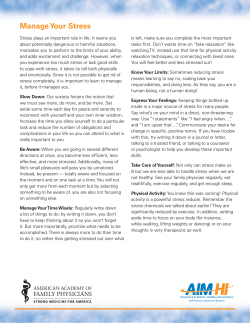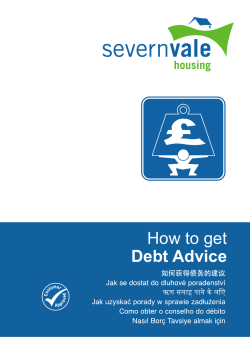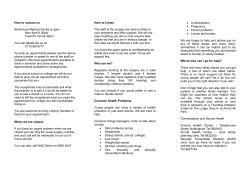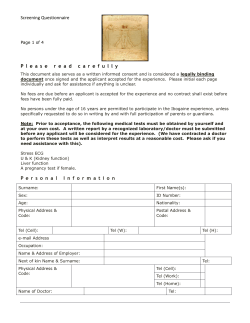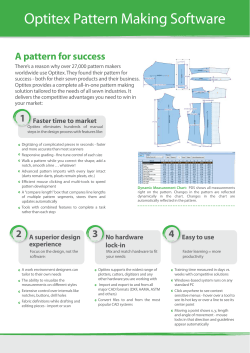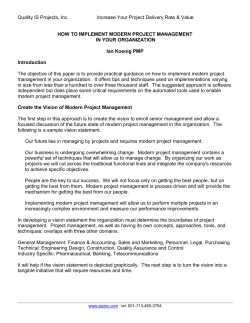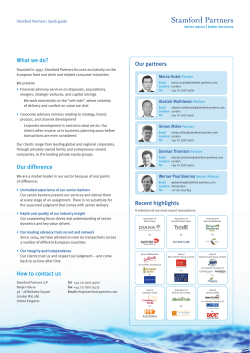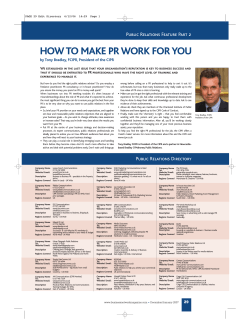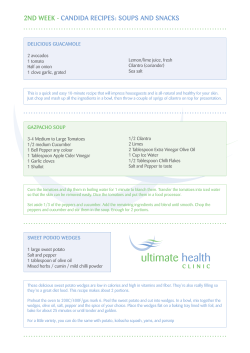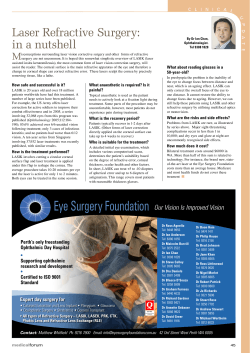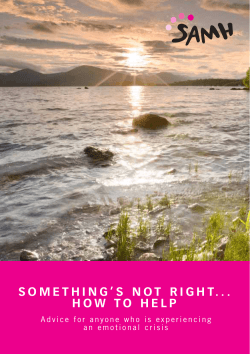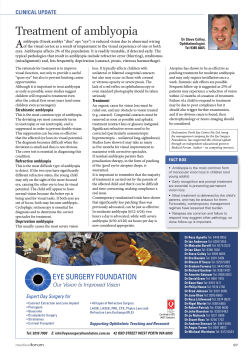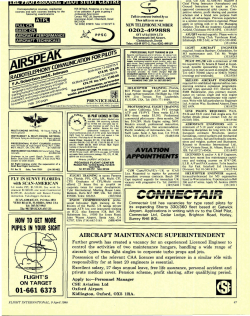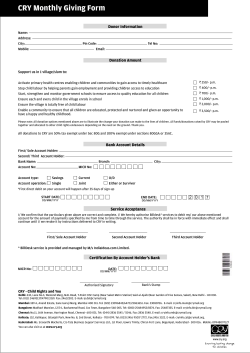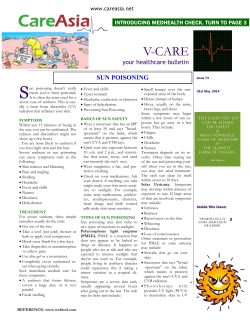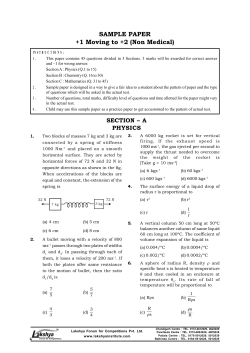
Manage Stress Before It Manages You RUSH
Manage Stress Before It Manages You TO DO LIST UR RU SH GE NT 02 INTRODUCTION Do you have trouble concentrating? Are you always worrying? Do you feel anxious such that your hands tremble and your palms get sweaty? These are all signs of stress. You can control stress and not let it control you! WHAT IS STRESS? Stress is the body’s response to any physical or emotional changes in life. This response includes the release of a hormone, adrenaline, in the body. Adrenaline causes an increase in heart rate, breathing and in blood sugar levels. It also diverts the blood flow from your digestive system to your muscles (e.g. leg muscles). This response prepares you for “fight or flight”. Therefore you will feel more alert. We all experience stress as we cope with daily events. Daily demands such as rules, responsibilities, decisions, changes, relationships, illness and money can cause stress. Stress can give life some spice and excitement. Positive stress helps you to cope with problems that might arise. On the other hand, living under very stressful conditions for long periods of time, may harm your health, your relationships, and your enjoyment of life. 03 WHAT ARE THE CAUSES OF STRESS? Both positive and negative life events can lead to stress. Common causes could include: LOANS & BILLS Major Life Changes Death of loved ones Marriage Accidents Pregnancy Legal issues New job Relocation Divorce Debt Unemployment S LOAN Illness BILLS Environmental Events Excessive noise Competition Traffic jams Health epidemic Time pressure HOW STRESS AFFECTS US DIFFERENTLY Everyone reacts and copes with situations differently and thus we experience stress to different levels of intensity. Your body sends out various physical, mental, behavioural and emotional warning signs of stress. Physical Signs of Stress Emotional Signs of Stress • Headaches, migraine, stomach aches • Anxiety and being bad-tempered • Muscle tension • Excessive worrying, moody • Stomach ulcers • Sadness, fear • Fast heartbeats • Feeling inadequate • Sleep disruption • Loss of appetite or overeating Mental Signs of Stress • Sweaty palms • Poor concentration • Trembling • Forgetfulness • Chronic fatigue • Lack of confidence 04 Behavioural Signs of Stress • Acting in a defensive, aggressive or impulsive manner • Nervous habits (e.g. stammering or biting nails) • Avoidance of tasks • Easily distracted • Withdrawing from social activites • Drinking or smoking excessively • Loss of interest in activities HOW CAN STRESS AFFECT OUR HEALTH Prolonged stress exposes our body constantly to the effects of adrenaline and will lead to many health problems: • decreased immunity levels, thereby increasing our chances of getting colds and other illnesses • worsening of asthmatic conditions • increased blood pressure that will increase the risk for stroke and heart attacks and even kidney problems • digestive problems like indigestion, constipation or even diarrhoea • depression, nervous breakdown or mental illness WHAT WE CAN DO TO MANAGE STRESS Some people have a negative way of coping. They take drugs, consume excessive alcohol, smoke, binge on food and injure themselves. These only mask the stress they feel, harm their health and even cause emotional and financial burden to their family. We would not be able to get rid of stress altogether, but we can manage it at a level that we can handle. The stress busters, in the following pages, tell you some positive ways to cope with stress. 05 Stress Busters! 1. Plan your time well Keep a daily planner. Give priority to the most important activities and do them first. Break large demands into small, manageable parts. Work through one task at a time. Decide how much time you need for each job. Be careful not to overorganise. Leave some room for flexibility and spontaneity. Planning ahead helps you to complete the tasks you have prioritised. This allows you to have a sense of achievement for the tasks you have completed. 2. Be realistic about what you can do Choose your work according to your own abilities and interests. Focus on what you can do and not for the impossible. Set goals that are achievable so you don't become frustrated or discouraged. Month 1 Month 2 Duration Name Definition Project 1 XXXXX XXXX XXXXXXXX XXXX End of Project 1 Project 2 XXXXX XXXX XXXXXXXX XXXX End of Project 2 Task Critical Phase Non-critical Phase Slack Phase Month 3 Month 4 06 3. Spread out the major changes in your life Give yourself time to adjust from one change to another. For example, avoid changing jobs, buying a car or a flat all at the same time. 4. Speak to someone about your problems Seeking help is not a sign of weakness. Sharing your worries and concerns with your spouse, family, friend, supervisor or religious leader helps relieve your emotional burden and provides with you with emotional support. Try joining relevant support groups in your community. Call a helpline if you need to speak to a counsellor (see page 13). 5. Interact with your family and friends Family and friends are a key component of your life. They provide you with friendship, love and support in times of need. Set aside some time each day to talk and relax together. 6. Learn to like yourself and think positive Be happy with who you are. Keep a positive attitude and outlook in life. This helps you to accept what you cannot change and make the best of what you have. Don’t be overly concerned about your looks. If you are concerned about your weight, speak to your doctor or a nutritionist, who would be able to assess your weight status and give advice on weight management, if necessary. 7. Keep healthy Keep your body healthy and fit by exercising regularly, eating wisely and getting enough sleep. Engaging in regular physical activity releases endorphins which give you a natural “high”. Eating a healthy and balanced diet based on the Healthy Diet Pyramid will provide the recommended level of nutrients needed to boost the immune system. 01 07 8. Make some time for yourself Do something that you really enjoy. Take up a hobby like dancing, painting or a sport. Take a short break when you feel tense or tired. Get up and stretch, or take a short walk. When you return to your work, you can concentrate better. 9. Learn some relaxation techniques Deep breathing exercises, meditation, massage and muscle relaxation techniques help to relieve stress. (Refer to page 11 for the details.) MORE STRESS-BUSTING TIPS Your Work Life Be clear about your roles Know your job scope and what is expected of you. If not, clarify with your supervisor. When working in a team, know each other’s roles and responsibilities. Communicate regularly to ensure that the projects are on schedule. Delegate work, where appropriate. Prioritise your work Plan a timeline for your projects. Start on projects that require immediate attention. Allow an additional 10% of your time for unforeseen circumstances. Be realistic in what you can do Start a job only when you can and have time to finish it. Similarly, do not take on new workload when you are up to your neck in work. Learn to say 'no' when necessary. No 08 02 Plan your meeting and start on time Set the objective and agenda for your meeting and request cooperation from team members to be punctual. This helps reduce time wasted discussing irrelevant issues and waiting for everyone to get started. The extra minutes saved can be spent on productive work. Practice 'power' chat Keep business telephone conversation brief and concise. Don't get into the habit of chatting too long which could affect your work productivity. Counter negative thoughts I can do it! Watch out for negative thoughts at work. Stop worrying about how you appear to other people. Focus on your good qualities and accomplishments. Counter negative thoughts with positive affirmations such as ”I can do it!”. Add helpful reminders to your screen saver, such as, "Take a deep breath," or add a phrase 5 or joke that makes you laugh. Be fit and healthy Join your workplace health programmes such as exercise classes, stress management courses or quit smoking programme, to keep healthy and fit. Your Personal Life Plan your household chores Spread out the tasks that need to be done over the week. Avoid doing too many tasks in one day if you can. Prepare a list for grocery shopping so that you don't miss out on buying items that you need. Plan your vacation Plan your travel arrangement early and find out more about the place you are visiting (e.g. weather and road conditions, medical facilities, visitor's attractions, safety matters etc.). 01 09 Prepare a list of items you need to bring along: Things - important documents - medication (if applicable) - contact details in case of emergency If you have pets, make arrangement for someone to take care of them, especially if you are away for an extended period of time. to bri ng: - pass ports - Lina ’s Me dicine - Hote l rese rvatio n numbe r - Hand phone Plan for festive periods or gatherings List the people you would be visiting and plan your time. Write down a gift list and purchase the gifts in advance, if necessary. If you are organising parties or social gatherings, prepare an invitation list and plan the menu. If necessary, make catering arrangement early. Plan your child care arrangement Be aware of the facilities, programmes and deadline for infant / child care / schooling arrangements. For working adults with young children, there are infant / child care centres and before and after school care facilities that will help look after your children while you are at work. Find one that suits you. Recognise the responsibility if you are caring for an elderly Be aware of the demands when caring for an elderly, especially if they have a medical condition that requires regular medication and frequent visits to the clinics / rehabilitation centres. Modifications to the home environment, e.g. renovations can be made to provide a safer environment for the elderly. You can find useful stress-busting tools in page 10 as well as pages 15 and 16 to help you look out for signs that you are stressed and to manage your stress well. 10 02 Stress-Busting Tool The list of questions below are intended to help you realise how stress may affect you. The more ticks you have for “Always” and “Sometimes”, the more likely you are experiencing some form of stress. Please note that this may not be a very comprehensive diagnostic tool. If necessary, speak to your doctor or a mental health professional. to always have to live up Do you feel that you others’ expectation? trate are not able to concen Do you find that you on your tasks? it epless nights or find Do you suffer from sle e night, often waking up th hard to sleep through ? feeling tired ortness of breath? Do you suffer from sh in lpitations or tightness pa om fr er ff su u yo Do cramps? the chest or stomach eaty palms? Do you suffer from sw ked say no when you are as Do you find it hard to do? to to accept more tasks the time? Do you feel tired all el sad? Do you constantly fe ting? Do you have trouble ea tightness? er from chest pains or Do you suff enjoy the difficult to pause and Do you find it simplicities of life? lems equent digestive prob Do you suffer from fr ion or indigestion? at like diarrhoea, constip nch h or clench and uncle Do you grind your teet your fists? fun set aside time to have Do you find it hard to and enjoy yourself? Always Sometimes Never Always Sometimes Never Always Sometimes Never Always Sometimes Never Always Sometimes Never Always Sometimes Never Always Sometimes Never Always Sometimes Never Always Sometimes Never Always Sometimes Never Always Sometimes Never Always Sometimes Never Always Sometimes Never Always Sometimes Never Always Sometimes Never 08 01 11 RELAXATION TECHNIQUES Deep Breathing Give yourself 5-10 minutes to do this exercise. 1. Switch on some soft and relaxing music. 2. Dim the lights, if you can. 3. Sit down or lie down in a comfortable position. 4. Close your eyes and place one hand on your stomach right above your waist. 5. Take a deep breath slowly though your nose. Feel your stomach slowly rise up. 6. Slowly breathe out, gently through your mouth. 7. Focus on your breathing and feel the air moving in and out of your body. 8. Repeat step 4 & 5 several times until you feel relaxed. 9. When done, slowly open your eyes. Visual Imagery Give yourself 10-15 minutes to do this exercise. If you have more time, start with deep breathing exercise, followed by a visual imagery exercise: 1. Find a quiet comfortable place. Switch on some soft and relaxing music. 2. Dim the lights. 3. Sit on a comfortable chair or lie down. 4. Close your eyes. Put aside all your worries and concerns for the moment. 5. Breathe in slowly, steadily and deeply. Relax all your muscles and let your body go limp. 6. Let your mind imagine a pleasant scene. Imagine that you are walking in a pathway lined with lush greenery, flowers in bloom and birds singing to you. 7. Feel the cool fresh breeze around you. Take a deep breath, in and out. 12 8. Imagine that at the end of the pathway, there are white, sandy beaches and the shiny pebbles lining the shore. Take a deep breath, in and out. 9. Feel the smooth and cool pebbles. Take a deep breath, in and out. 10. Continue this visualisation until you feel very relaxed. 11. Slowly count to 10 and you will come to a more alert, wakeful and refreshed mind. 12. You can also choose to do this relaxation exercise using an audio-guided CD*. Muscle Relaxation It is recommended that you use an audio-guided CD* to do the muscle relaxation exercise. Give yourself about 20-30 minutes for this exercise. 1. Find a quiet comfortable place. Switch on some soft and relaxing music. 2. Sit on a comfortable chair or lie down. 3. Gently close your eyes. Put aside all your worries and concerns to concentrate on relaxing your body. 4. Breathe in slowly, steadily and deeply. 5. Focus your attention to your hands and fingers. Clench your fists as tightly as you can and count to 10. 6. Notice the pull of your hand muscles. Feel the tension. Then release the tension very slowly by letting your hands unfold as you count to 10. 7. Feel the warm tingling sensation on your hands as you relax. Let the tension drain out of your hand. 8. Repeat this exercise with any part of your body - face, head and neck, arms and shoulders, abdomen, buttocks, legs, feet and ankles. Refer to an audio-guided CD* for detailed instructions. * An audio-CD on relaxation can be bought from Health Information Centre, Level 3, Health Promotion Board, 3, Second Hospital Avenue, Singapore 168937. For further enquiries, kindly contact Tel: 6435 3954 or Email: hpb_hic@hpb.gov.sg 01 13 COUNSELLING SERVICES If you need help or someone to talk to: Make an appointment to see a counsellor*: Institute of Mental Health Fei Yue Counselling Centre http://www.imh.com.sg Tel: 6563 1106 Tel: 6389 2200 Shan You Counselling Centre Family Service Centre Hotline Tel: 6741 9293 (find your nearest counselling centre) Tel: 1800 838 0100 Counselling and Care Centre * fees may apply Tel: 6536 6366 Call a helpline: Samaritans of Singapore (24-hour) TOUCH Caregivers Centre http://www.samaritans.org.sg (for caregivers) Tel: 1800 221 4444 http://www.caregivers.org.sg Tel: 1800 352 1622 Singapore Association for Mental Health (Mon-Fri 9am-6pm) http://www.samhealth.org.sg Tel: 1800 283 7019 Association of Women for Action & (Mon-Fri 9am-1pm, 2pm-6pm) Research (for women in distress) Care Corner (Mandarin) http://www.carecorner.org.sg Tel: 1800 353 5800 http://www.aware.org.sg Tel: 1800 774 5935 (Mon-Fri 4pm-10pm) (10am-10pm daily) Parent Line Singapore Action Group of Elders (for older adults) http://www.sage.org.sg Tel: 1800 353 8633 (Mon-Fri 9am-7pm, Sat 9am-12.30pm) (for parents with parenting and childcare issues) Tel: 6289 8811 (Mon-Fri 9am-5pm) 14 For more information on health matters: Call HealthLine, the toll-free telephone health information service available in 4 languages. • Personal advice by a nurse counsellor 1800 223 1313 Mondays to Fridays: 8:30am-5.00pm Saturdays : 8.30am-1.00pm • 24-hour pre-recorded health information service 1800 848 1313 • Visit our website at www.hpb.gov.sg All the information above is correct at the time of printing. rs e t numb an import Other 01 15 Notes Below is a diagram that will guide you to note the types of event that will stress you as well as the signs you show when you are stressed. Use it as a tool to identify your stress and ways of managing it. c Stressful Events i o u r i al S i g n c Physical Signs av h e B c c M e n t al S i g n s Emotional Signs s 16 Ways of Coping 01 Ways of Coping 17 Health Promotion Board 3 Second Hospital Avenue, Singapore 168937 www.hpb.gov.sg Copyright © HPB B E 433-05 March 2005 Designed and printed by Ingrid Design Pte Ltd Recycled Paper
© Copyright 2025
